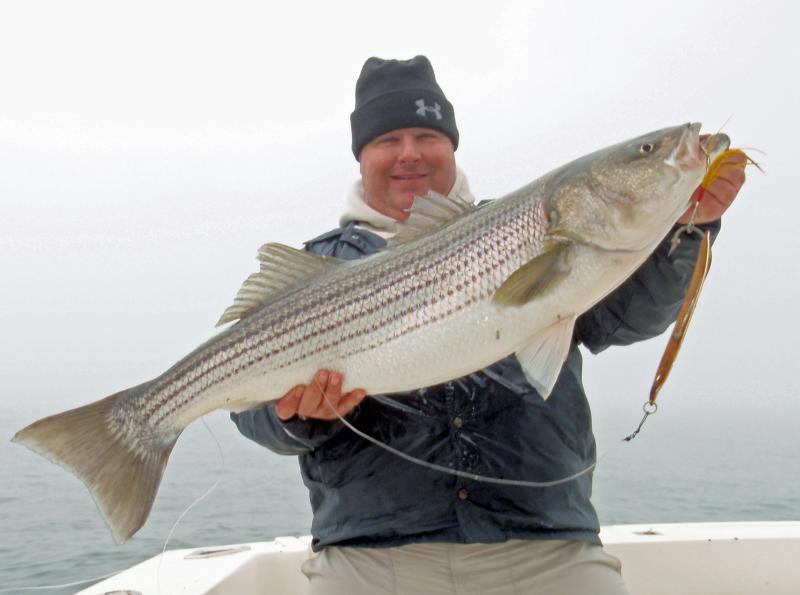Be prepared when fishing alone
I have a friend in Virginia who recently ran his boat out into the ocean about 20 miles to go tog fishing. He often fishes alone, and on this winter day he did exactly that.
I too have fished alone in all of my boats from 14-foot tin boats to my 24-foot Albemarle.
Back in the day, when we had our camper at Bayshore in Ocean View, I would get up around dawn, launch my 14-footer and fish wherever the wind and tide told me to. If I was lucky enough to catch a few flounder, I would be back to the camper in time for breakfast with the family. Once the boys were old enough to fish, they would go with me and give their mother a little rest.
I had the Albemarle in Virginia Beach in a dry storage facility, so launching was easy. I would sometimes take it out alone to fish the Chesapeake Bay Bridge Tunnel for blues, stripers or drum. I also had a radio show out of Norfolk, and on Saturday, after I was off the air at 8 a.m., I would take a Grady White out of Norfolk Marine and do a radio report from the water until noon. I was back out on Sunday from 8 a.m. until noon.
All of these solo boat trips were reasonably close to land with my VHF radio close at hand. Today, you would also have your cellphone as backup. Once you get offshore, neither the VHF nor the cellphone will be of any use.
My friend in Virginia was pushing it by going out 20 miles all alone. Should he encounter a problem, it would take quite awhile for help to arrive.
If you are going to fish alone, you should be prepared to handle boat and personal problems by yourself. Everyone should have the usual spare parts on the boat and the tools to install them. Things like fuses, a spare prop, two batteries for your motor, a handheld VHF, an EPIRB and all required safety equipment.
The thing that scares me the most about being alone on a boat is an accident that results in a serious injury. The first thing you must do is stop any bleeding. They have a product that I carry with me on all fishing trips called Bleed Stop. It is a white powder and you put it on the wound and apply pressure to stop the bleeding. If that does not work, use Super Glue. That’s right, the stuff will glue the wound shut.
As soon as you can, call the Coast Guard on Channel 16. Tell them your current position and your situation. Don’t be a hero. If you are hurt and need help right away, tell them.
When I was in Virginia Beach, we had a different situation. The owner of the boat had several friends out for a day of fishing when he died from a heart attack. No one on the boat had any idea how to operate it. Fortunately, a friend of the owner was in a nearby boat and was able to put an experienced operator onboard to get them back to the dock.
Striped bass regs
To no one’s great surprise, the Atlantic States Marine Fisheries Commission has made the emergency striped bass regulations issued last summer a part of the permanent regulations that govern striped bass in the ocean out to three miles from shore and all inland waters. The ocean slot limit will be 28 to 31 inches as it has been since the emergency regulations were issued. The inland waters, such as Delaware Bay, will have to reduce its catch by 14.5%. This will mean the loss of 1 inch from either end of the 20- to 25-inch slot in the bay during the two-month summer season.
Since Delaware does not have a robust striped bass fishery, these regulations don’t handicap our anglers. At the end of 2023 and the beginning of 2024, we had a decent run of big stripers, but by then most charter and head boats were done for the season, and the few that were running were after sea bass or tog. It is hard to convince a charter or head boat angler to spend all that money to play catch and release. Most want some meat to take home.
At one point in early January, I had friends in New Jersey and Delaware and my son Ric in Virginia Beach all catching big striped bass on the same day. I realize reproduction is in dire straits, but the amount of big, spawning-sized females seems to be more than ample. What we need are the perfect conditions in the spawning rivers from the Chesapeake to the Hudson, and there is nothing man can do to create those. That is all up to Mother Nature.



















































